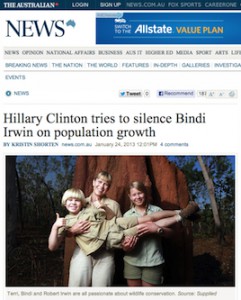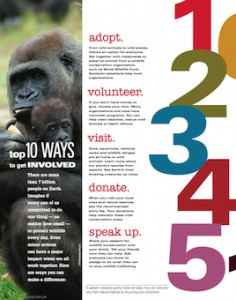Hillary Clinton Runs and Hides from Overpopulation Issue
Maybe you haven’t heard about it. After all, it’s a taboo. We tiptoe around the subject of population growth as though it could give you a bad case of leprosy. Even when the topic is addressed, the word “overpopulation” is frequently avoided. Presidents, journalists, and humanitarian and environmental organizations head for the hills when the conversation turns to the role of population growth in hunger, poverty, climate change, species extinction, fresh water availability, desertification, deforestation or fisheries depletion.
 I’ve written about this before. My GrowthBusters film put a spotlight on it. I’ve posted YouTube videos about it (see list below), and others have written on the subject. But it’s not everyday we get such an overt, classic, textbook example as the one delivered on a silver platter last month by the U.S. State Department. It was chronicled nicely in The Australian.
I’ve written about this before. My GrowthBusters film put a spotlight on it. I’ve posted YouTube videos about it (see list below), and others have written on the subject. But it’s not everyday we get such an overt, classic, textbook example as the one delivered on a silver platter last month by the U.S. State Department. It was chronicled nicely in The Australian.
The agency had invited environmental/wildlife champion Bindi Irwin to write a brief essay about her commitment to wildlife conservation, for publication in eJournal USA. The December edition of eJournal, headlined Go Wild: Coming Together for Conservation, promoted a State Department initiative to protect wildlife and reduce trafficking of illegal wildlife goods.
LIKE WHAT YOU’RE READING?
Subscribe to this blog, right over here –>
 Fourteen-year-old Bindi is the daughter of the late Steve Irwin (a conservationist catapulted to fame in The Crocodile Hunter TV series). The Irwin family runs the Australia Zoo, and – following her father’s death in 2006 – Bindi has carried on in her father’s footsteps as a very popular public conservationist figure.
Fourteen-year-old Bindi is the daughter of the late Steve Irwin (a conservationist catapulted to fame in The Crocodile Hunter TV series). The Irwin family runs the Australia Zoo, and – following her father’s death in 2006 – Bindi has carried on in her father’s footsteps as a very popular public conservationist figure.
Bindi’s original essay included this exceptionally astute observation:
“I believe that most problems in the world today, such as climate change, stem from one immense problem which seems to be the “elephant in the room” that no-one wants to talk about. This problem is our ever expanding human population.”
But when Hillary Clinton’s team finished their hatchet job on Bindi’s essay, it was unrecognizable. The word population doesn’t appear even once. Compare this one paragraph, just to get a sense of how egregious the editing was. Here it is after Clinton’s team had their way with it:
“Like many wildlife conservationists, I believe that the greatest threats to the world’s animals stem from one incontrovertible fact that seems to be the “elephant in the room” that we don’t like to discuss: We humans are consuming Earth’s resources – including its wildlife – faster than they can be replaced.”
I struggle here to find a nice word to describe this. It really disgusts me that the bureaucrats working on an endangered species initiative are too lily-livered to acknowledge the truth: human overpopulation is pushing other species off the planet. Adding insult to injury, they flipped over to the standard progressive do-gooder mantra that the problem is we are consuming too much.
I don’t disagree that we have a consumption problem, but why is it some people have no trouble telling you your house is too big, you drive too much, or to stop eating hamburgers, but they can’t bring themselves to recommend you limit the size of your family? Are they waiting until we’re all living on top of each other in tiny cells, eating rations of Soylent Green, to finally admit that humans have overpopulated the Earth?
Bindi was not pleased with the complete rewrite Hillary Clinton’s team did to her essay, so she asked the State Department not to publish it. She told news.com.au, “Population is an issue no one wants to talk about and it seems to be very controversial (but) if you look at any conservation problem today it all stems from population.”
Bindi’s mother, Terri, told The Australian, “I just think it’s fascinating that when Bindi does an interview and talks about population, more than 50 per cent of the time it’s edited out. It’s something we do need to talk about or the ship’s going to sink man.”
 A State Department spokesperson told The Australian that Bindi’s essay’s focus on population wasn’t consistent with the focus of the journal. To be fair, it wasn’t. The journal focused very heavily on trafficking in illegal wildlife goods. Human population was mentioned just twice, somewhat incidentally. Pieces describing the work of such conservation organizations as Wildlife Conservation Society, World Wildlife Fund and Association of Zoos & Aquariums made no mention of human population whatsoever. In fact, the journal’s “Top Ten Ways to Get Involved” say nothing about reducing family size or even consuming less. It’s a lightweight, feelgood, ineffective approach to a serious global issue.
A State Department spokesperson told The Australian that Bindi’s essay’s focus on population wasn’t consistent with the focus of the journal. To be fair, it wasn’t. The journal focused very heavily on trafficking in illegal wildlife goods. Human population was mentioned just twice, somewhat incidentally. Pieces describing the work of such conservation organizations as Wildlife Conservation Society, World Wildlife Fund and Association of Zoos & Aquariums made no mention of human population whatsoever. In fact, the journal’s “Top Ten Ways to Get Involved” say nothing about reducing family size or even consuming less. It’s a lightweight, feelgood, ineffective approach to a serious global issue.
This is just one example of an affliction shared by most of the environmental movement – working on mitigating the effects of economic and human population growth, but avoiding the root causes. It’s just too difficult and potentially unpopular to tell the truth.
In a particularly pointed review of a Scientific American special issue about climate change, physicist Al Bartlett chastised the authors for avoiding the subject, dubbing this phenomenon “the silent lie:”
“Scientific American has rounded up the usual suspects but has ignored the perpetrator of the crime. The editors and writers at Scientific American know that population growth is the underlying source of the problems, but it is politically incorrect to state this obvious fact. Mark Twain wrote that if one has information that would help others, but does not share that information, then one is telling a ‘Silent Lie.”
Mother Jones magazine acknowledged it as a “silent conspiracy” in the subtitle to its 2010 story on population, The Last Taboo.
Why is human overpopulation the third rail of environmentalism? One hint is offered by this blog post about Bindi Irwin’s scuffle with the U.S. State Department: Hillary Clinton’s E-Journal Retracts Neo-Malthusian Essay By Crocodile Hunter’s Daughter. Here, “investigative writer” Jurriaan Maessen wrote:
“Irwin, in response to the assignment, spoke her mind, regurgitating the same old neo-Malthusian death-talk we have become accustomed with from the mouths of conservationists such as David Attenborough, Paul Ehrlich and other people devoted to reducing the world’s population ‘for the earth’.”
NEO-MALTHUSIAN! Oh my god. That’s a horrible, terrible, very bad thing to be. What is it? It’s actually a bunch of organically grown nonsense from growth boosters (those who would rather take short-term profit from growth today than have a long-lasting, sustainable world tomorrow), eco-socialists, pro-lifers, the Catholic Church, and anyone else mortified at the thought of a stable or declining population. Over the years they’ve whipped out that adjective so many times, it eventually came to mean evil, wrong, baby-hating, racist, elitist, eugenicist, controlling, abortionist, slime.
Of course, the term was originally coined to describe someone who subscribes to the thinking of Thomas Malthus. Malthus was an early 19th century political economist who came under fire for theories he expressed in An Essay on the Principle of Population. He espoused that there were limits to our ability to wring more food out of the land, and that would ultimately limit our population. He described a cycle in which human population would at times overshoot the capacity of our technology and natural resources, and that starvation would bring our population back into line with the planet’s ability to sustain us. This was not optimistic enough for some, namely economists and industrialists (big surprise), so the name-calling began. Among the ill-informed today, Malthus and Malthusianism have a very negative, but undeserved, connotation.
 “Neo-Malthusian” became another talking point in the toolkit of overpopulation deniers. It was used so many times in the process of blackwashing sustainable population advocacy, it finally lost its original meaning. Now it is pulled out and mindlessly slapped on a person whenever someone wants to use a sustainable population advocate as a whipping boy. Sadly it was used last week by Jurriaan Maessen to denigrate a 14-year-old girl working to save Koalas. I seriously doubt most users of the word have a clue as to what it really means.
“Neo-Malthusian” became another talking point in the toolkit of overpopulation deniers. It was used so many times in the process of blackwashing sustainable population advocacy, it finally lost its original meaning. Now it is pulled out and mindlessly slapped on a person whenever someone wants to use a sustainable population advocate as a whipping boy. Sadly it was used last week by Jurriaan Maessen to denigrate a 14-year-old girl working to save Koalas. I seriously doubt most users of the word have a clue as to what it really means.
The overpopulation deniers so relentlessly hammered at the sustainable population advocates that they finally succumbed. Political correctness won out over scientific correctness. Zero Population Growth became Population Connection. Optimum Population Trust became Population Matters. “Population growth became “population dynamics.” Contraception became “reproductive health,” and then “family planning.” Sustainable population advocates were advised to do an end run around the issue and “simply support economic development and gender equity; that’ll take care of it.” Anything but telling the truth.
Because sustainable population advocates have headed for the hills in response to these attacks, we have so far failed to present a truthful view of what we are about. Too few understand that limiting family size is a loving, compassionate act by parents who want the best for their children and all the children of the world.
I’ll end with some sound advice offered by professor of medical demography John Cleland at a population conference in 2006:
“we’ve got to use straightforward robust language. It does this cause no service at all to continue to shroud family planning in the obfuscating phrase “sexual and reproductive health. People don’t really know what it means. If we mean family planning or contraception, we must say it. If we are worried about population growth, we must say it. We must use proper, straightforward language. I am fed up with the political correctness that daren’t say the name population stabilization, hardly dares to mention family planning or contraception out of fear that somebody is going to get offended. It is pathetic!”
Dave Gardner
Filmmaker
Suggested YouTube Videos:
Overpopulation: We Beat Around the Bush (segment from GrowthBusters movie)
Why the Population Taboo?
Al Bartlett on the Population Taboo and ZPG
Suggested Essays and News Stories:
GrowthBusters Blog: Population Taboo – Kiss It Adieu!
BBC News: Population: The elephant in the room
HowMany.org: The Population Taboo
PostGrowth Institute: Population Taboos? No Kidding!
Trackback from your site.




Dave Gardner
| #
It’s been pointed out that Hillary Clinton has been an advocate for improving the lives of women. It is not my intent to vilify Ms. Clinton. It is my intention to simply point out yet one more example of sidestepping the vital truth about overpopulation. I am taking her to task for that even while I applaud much of what she has done. This is an area she can do better. In all honesty, she probably didn’t even know about the Bindi Irwin essay last December. I’m sure that was handled several levels below her.
Our next secretary of state can do even better. He can let his staff know that it’s okay to talk about overpopulation.
Reply
Brian Sanderson
| #
Do you know of one instance when Mrs Clinton has publicly raised concerns about the excessive growth of the human population?
As far as I can discern, politicians (in USA and elsewhere) are all actively promoting population growth. So the fact that Mrs Clinton speaks against the oppression of women — and who but a thug wouldn’t speak against the oppression of any fellow being — is irrelevant to the matter at hand.
Reply
Brian Sanderson
| #
I Have to correct myself, there is one politician, Kelvin Thomson, who has the fortitude to state a few reasoned thoughts on population
Reply
admin
| #
Yes, kudos to Kelvin Thomson!
Reply
Piyush
| #
Excellent article, very well articulated, thanks for writing Dave. I hope this one gets circulated far and wide. Kudos to Bindi, she is an inspiration to everyone fighting to end the population taboo.
Reply
RobM
| #
I saw GrowthBusters today at a local film festival. I thought it was brilliant and is without doubt the best film produced to date on our predicament. Well done and thank you!
In the spirit of this article about avoiding difficult issues, I have one small criticism of the film. I fully agree that we must choose to stop growing and shrink our economy or else nature will choose for us on her terms. I think however that the film glossed over the implications of a no growth economy.
It is not simply a matter of saying we have enough stuff now, let’s level off here. As the film pointed out, we have a debt based system that is enabled by growth. Without growth, most existing debt will default, and new debt will be expensive and scarce.
This has two huge implications:
1) All governments and the majority of citizens are living beyond their means today by consuming with debt. If we stop growing, government services and our consumption will not just level off, they will dramatically decrease due to the scarcity of debt.
2) Most of the retirement savings in the world are invested in debt and equities. If growth stops, a majority of debt will default and stock prices will fall which means a lot of retirement savings will be wiped out.
There is another implication of no growth that the film did not mention. In a no growth world the only way for one group to improve their material standard of living is for another group to reduce their material standard of living. The gap between rich and poor countries and the gap between rich and poor people within countries is huge. We get away with it today because in a growing global economy there is the possibility for everyone to get richer. In a no growth world the poor can only close the gap if the rich give up some wealth. Thus the rich must agree to reduce their standards of living even more than points 1) and 2) above will require if we are to avoid social unrest and war.
Reply
Dave Gardner
| #
Thanks, RobM, for these comments. I’m glad you made the point about the need for the rich to scale back in order to leave room on the planet for the poor to live decent lives. This is absolutlely essential.
When we say “the rich,” we mean the vast majority of people in North America, Europe and Australia. We’re not just talking about the Koch brothers and Richard Branson. Progress is slow in getting folks to scale back. While living more simply can actually be more fun and fulfilling, many are trapped on the treadmill in service to our growth-obsessed system. And many don’t recognize growth is no longer delivering good lives. This makes it doubly important that we focus on reducing population while we simultaneously try to help everyone step off that treadmill. No question there will be numerous adjustment pains as we get it right. But get it right we must.
Reply
RobM
| #
Thanks, I agree. You should be very proud of your film. I have purchased a copy in support of your efforts.
Reply
Dave Gardner
| #
You can hear what Bindi Irwin thinks of this in a news clip here: http://youtu.be/r_zDW6fCgZo
Reply
Antiroyal
| #
Hillary Clinton is an lying opportunist, As for overpopulation its a complete lie, do the maths for yourself, and as for those saying we need to depopulate, well why don’t you and your family go commit suicide then! You are a bunch of nazis, you declare yourself as a god and choose who lives or dies, you are all vile !
Reply
Dave Gardner
| #
Antiroyal, I am not removing your comment, even though it is offensive. My wish is for us to find a way past your fears and hate to get to the truth.
Today there is a lot of death and it is not by anyone’s choice. I’d like to see us eliminate needless death. Conceiving fewer children is actually pretty kind when you think about it – if conceiving 4 means a few will have to die because the planet can’t support 8, 9 or 10 billion, and conceiving just one means fewer will die because our population will decline back out of overshoot.
Nowhere am I suggesting that anyone die, let alone that I would decide who dies.
Reply
Achim Wolf
| #
Ladies and Gentlemen,
Scientists warn of a rapid collapse of the Earth’s ecosystem.
The ecological balance is under threat: climate change, population growth and environmental degradation could lead even in this century an irreversible collapse of the global ecosystem.
–> http://newscenter.berkeley.edu/2012/06/06/scientists-uncover-evidence-of-impending-tipping-point-for-earth/
The cardinal reason is the sudden development of human population that threatens to devour all our resources.
Since 21 August there is therefore a petition at change.org for the introduction of global birth-controls, also in HINDI!
If you want to support this or publish it on your website, here is the link:
http://www.change.org/de/Petitionen/weltweite-geburtenregelungen-verbindlich-einf%C3%BChren-introduce-obligatory-worldwide-birth-controls
Please continue to spread the link or the petition as possible to all interested people, organisations etc.
Thank you and best regards
Achim Wolf, Germany
Reply
deirdre feistere
| #
Achim Wolf : Danke viermal ! Ecopop Schweiz ist mogliche! Thank you 4 times for the information. Ecopop in Switzerland is one of the most successful initiatives even though the growth pushers and religious people voted against it. I have suggested educational exhibits on population growth and contraception to nature preserves along with a donation for such an exhibit and they have all declined my offer. So, I have told them that my donations will go to real environmental organizations which do focus on contraception. If they don’t talk about population, then they do not get my donation
Reply